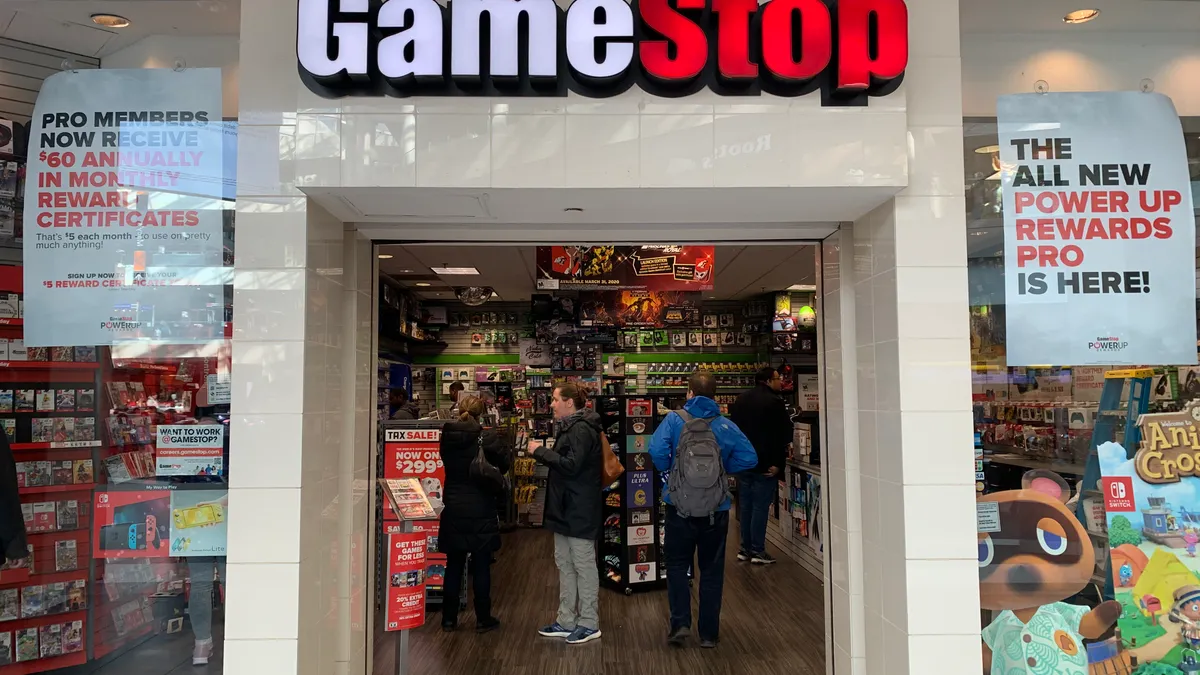Dive Brief:
- GameStop has cut a deal with activist investment firm RC Ventures that brings in three veterans from e-commerce pet specialist Chewy to its board of directors, according to a press release issued on Monday.
- Coming to the retailer's board are Ryan Cohen, the founder and former CEO of Chewy and manager of RC Ventures; Alan Attal, Chewy's former chief marketing officer; and Jim Grube, former CFO of Chewy and most recently CFO of vacation rental company Vacasa.
- On Monday, GameStop also posted its holiday sales results, showing a massive 309% year-over-year increase in e-commerce sales and a 4.8% comparable sales increase. Total sales fell 3.1% due to permanent store closures and COVID-19 disruption, the company said.
Dive Insight:
In November, after RC Ventures had acquired 10% of GameStop's stock, Cohen sent a letter to the retailer's board demanding the company "immediately conduct a strategic review of the business and share a credible plan" for moving forward in its sector. Cohen's firm later upped its stake to 13%.
The idea was to transform GameStop into a "technology company" rather than remain a "video game retailer," with its thousands of stores, that it has been for decades since its founding.
Cohen drubbed the board for not working toward that end. "Unfortunately, it is evident to us that GameStop currently lacks the mindset, resources and plan needed to become a dominant sector player," Cohen said in the letter. "The Company remains in long-term secular decline due to its apparent unwillingness to pivot with urgency and grow with gamers."
The gaming retailer said in a press release that the new board directors bring skills that would "support the Company’s continued focus on optimizing core operations and creating a powerful and exciting ecosystem for games and entertainment."
The activist intrusion follows an abysmal 2019 followed by a 2020 defined and made more difficult by the pandemic, which affected its operations worldwide.
Dizzying sales declines in 2019 were blamed by management on the transition between hardware systems, as gamers held off on purchases while they wait for new releases, like the Sony and Microsoft consoles. The excitement around the consoles' release helped lift a cloud hanging over the company and its performance.
During the nine weeks ending Jan. 2, GameStop said it "experienced unprecedented demand for recently launched gaming consoles, and while consumer demand far outpaced constrained supply in the nine-week period, the Company believes these products will drive sales well into 2021 as console availability from our suppliers improves later in the year."
Even so, the retailer faces deeper structural and existential challenges, as more games sell in digital and streaming formats — a transition that hit the media retail sector as a whole hard over the past 20 years.
GameStop's latest plans have run the gamut from merchandising revamps, fashioning its stores into gaming culture hubs and partnering more with product makers. Cohen's vision calls for a more internet-centric strategy.
"If GameStop takes practical steps to cut its excessive real estate costs and hire the right talent, it will have the resources to begin building a powerful e-commerce platform that provides competitive pricing, broad gaming selection, fast shipping and a truly high-touch experience that excites and delights customers," Cohen said in the November letter. "This is the type of world-class infrastructure that was constructed at Chewy, which is worth multiples of GameStop’s current market capitalization."
Jefferies analysts, led by Stephanie Wissink, praised the board changes in an emailed note and said that "the activist agenda is well directed and we favor an expedited timeline to transform the enterprise from a physical to a digital first business."
















